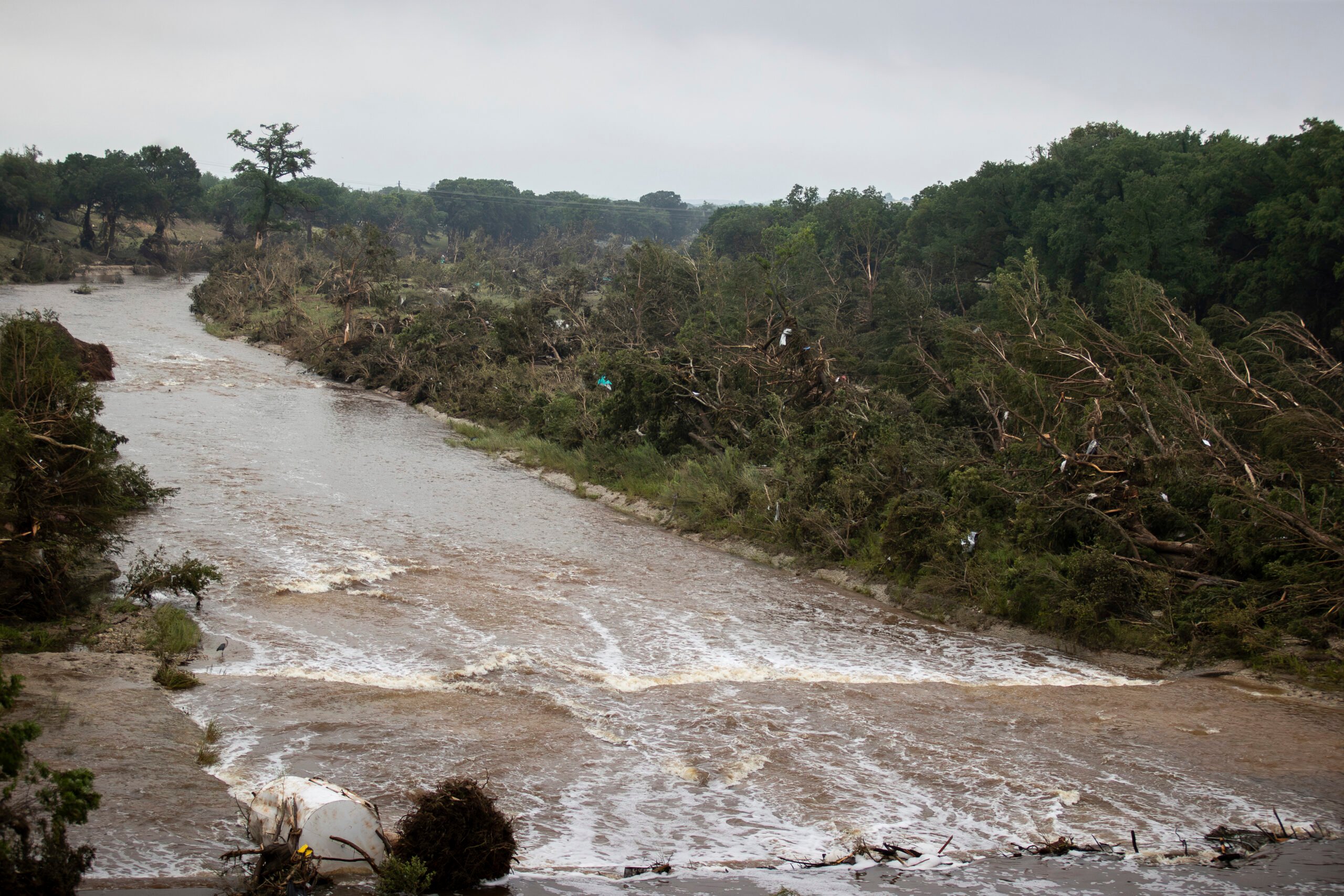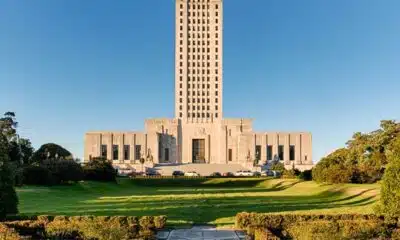News from the South - Texas News Feed
Texas GOP Says Flood Relief Is Priority. Here’s the Climate Policy They Won’t Pass.
Governor Greg Abbott’s first special legislative session this year appears headed for an abrupt end after House Democrats fled the state to protest the Texas GOP’s cynical exploitation of the deadly Fourth of July Hill Country floods to enact redistricting that would, at President Donald Trump’s orders, rig the maps to deliver Republicans up to five new congressional seats. Upon adjournment Friday, Abbott said he will immediately call another special session with the same agenda.
Before decamping to Illinois and other blue states, Democrats argued Abbott’s emergency powers already grant him the ability to unilaterally enact flood relief for the tragedy-stricken Hill Country. In a July 21 letter, House Democrats called on Speaker Dustin Burrows to prioritize flood response before any other business, arguing the GOP is deliberately holding flood relief hostage to Trump’s redistricting plan by putting the maps first on the agenda. Republicans have in turn attacked Democrats for abandoning their posts—and Hill Country flood victims.
In fact, the Texas GOP has had years to prioritize such critical disaster-response legislation but has instead refused to engage with hundreds of related proposed bills to better prepare for disasters and ensure more resilience to climate change. Such bills are once again going ignored as part of a longer pattern of climate-reactive discussions at the Legislature in which Republicans pull their collective fingers out of their ears only to offer piecemeal relief in the aftermath of deadly disaster.

Democratic state Representative Ron Reynolds, for instance, refiled a bill—one he’s carried for several years now—in the first special session aimed at creating a Climate Change Impact Assessment Council to study the impacts and cumulative costs of climate change on the state and measures that would mitigate flooding, erosion, drought, and wildfires. Democratic Representatives Erin Zwiener and Mary González likewise filed bills in the 89th regular session directing the Texas Commission on Environmental Quality and Texas State University to undertake similar climate impact studies.
“This effort of some of these bills goes back quite a ways, even back to when Eric Johnson was in the House,” said Public Citizen Texas Director Adrian Shelley, referring to the now-Republican mayor of Dallas who served as a Democrat in the Texas House until 2019. Johnson filed a similar bill as early as 2015 that would have mandated certain state agencies draw up strategic plans every two years to address climate vulnerabilities.
It’s just one example in a long history of bills planning for extreme weather that have been effectively dead on arrival in the Capitol. “It’s been an open secret in the Legislature for a while that if your bill has the word ‘climate’ in the caption, it’s not getting a hearing,” Shelley said. “That has been true for many sessions.”
The fate of the regular session’s HB 2618, authored by state Representative Rafael Anchía, a Dallas Democrat, underscores Shelley’s point. That bill would have directed several agencies including TCEQ, the Department of Public Safety, the Public Utility Commission, and the Texas A&M Forest Service, among others, to draw up “severe weather” adaptation plans every other year. The word “climate” is absent from the text. Anchía got two Republicans to sign on as joint authors, and the bill passed the House with bipartisan support (though it ultimately died in the Senate).
The word “climate” has also been missing from important disaster-response hearings. The phrase “climate change” did not come up once during the House Investigative Committee on the Panhandle Wildfires hearings near Amarillo last year, nor did it appear in the committee’s final report, which nonetheless noted the especially hot, windy, and dry conditions that fueled the flames that February.
But things may be starting to change—ever so slightly—this time around. The Texas State Climatologist John Nielsen-Gammon, who is tasked with studying state climate impacts, brought up climate change up during his recent testimony before the Senate and House Select Committees on Disaster Preparedness and Flooding in Kerrville in the context of his work with the Texas Water Development Board (TWDB) to map trends in extreme rainfall and estimate future risks.
Nielsen-Gammon made several recommendations to the committee, including improving monitoring of air masses arriving from both the Gulf and Mexico, improving coordination among state agencies regarding longer-range forecasts, and partnering with the Texas Division of Emergency Management to develop a real-time weather app. He and other meteorologists from the TWDB hope to form a technical committee to develop the recommendations into legislation for the next regular session.
But other recommendations from the same state agency Nielsen-Gammon is partnering with went ignored—until July 4. TWDB’s first-ever statewide flood plan, adopted in August 2024, outlined at least nine specific legislative proposals, including one to prioritize and expand “funding for implementing flood early warning systems on a regional scale, with emphasis on rural areas.”
That policy recommendation, along with those aimed at maintaining the Flood Infrastructure Fund and improving low-water crossing and dam and levee safety, are largely precautionary and were the product of an intensive outreach process.
Still, as of now, the primary flood response bills in the special session currently address only one of those recommendations: the installation of early-warning systems. The joint committee is working to hone an interoperability and disaster-response bill that largely resembles House Bill 13 from the regular session—which died in the Senate—that would have created a similar interoperability council to administer a statewide disaster-response plan and grant program for counties to build new warning and communications systems.
Beyond that, at least one other bill filed in the first special looked to be directly modeled on the TWDB’s recommendation to authorize counties to collect drainage fees to fund flood mitigation and regulate land for flood management—an issue that has proved central to the July 4 catastrophe, with Camp Mystic being just one of at least 12 camps built in or near hazardous flood areas in unincorporated areas.
A number of other climate mitigation and resilience bills—almost entirely authored by Democrats—went ignored in the regular session and surely would suffer a similar fate in any special session, too. Those included bills from state Representative Jon Rosenthal that would have eliminated routine flaring at fracked gas wells and directed the Texas Railroad Commission (RRC) to implement weatherization rules for fracked gas facilities. Another measure that would have required state agencies and higher educational institutions to lower energy consumption 5 percent over six years passed the House and died in the Senate.
Other bills took a proactive approach to disaster response, including measures from state Representative Christina Morales, a Houston Democrat, to create an alert system to notify nearby residents of toxic chemical releases from manufacturing facilities. At least four bills were filed with the aim of requiring backup generators at nursing homes and assisted living facilities.
While the GOP-dominated Legislature did approve measures to secure the state’s drought-stricken water supply during the regular session, lawmakers simultaneously passed laws that would supercharge climate impacts by delivering another $5 billion to the Texas Energy Fund to support the building of new fracked gas plants and fast-tracking the permitting process for liquefied natural gas terminals.
Climate justice advocates remain concerned that another bill to bar all political subdivisions from using taxpayer dollars to fund environmental projects—like pollution reduction and clean air programs—reared its head again in the first special session.
In fact, the only bill ever passed by the Texas Legislature that explicitly references climate change was a 2023 measure aimed at shutting down the adoption of climate policies by municipalities.
“I wish that we could just focus on what is important to Texans. Nobody asked for redistricting,” Public Citizen’s Shelley said. “One man asked for it.”
The post Texas GOP Says Flood Relief Is Priority. Here’s the Climate Policy They Won’t Pass. appeared first on www.texasobserver.org
Note: The following A.I. based commentary is not part of the original article, reproduced above, but is offered in the hopes that it will promote greater media literacy and critical thinking, by making any potential bias more visible to the reader –Staff Editor.
Political Bias Rating: Left-Leaning
The content presents a critical view of the Texas GOP and Governor Greg Abbott, emphasizing Republican resistance to climate change legislation and disaster preparedness. It highlights Democratic efforts to address climate impacts and disaster response, portraying Republicans as obstructive and politically motivated, especially regarding redistricting and flood relief. The framing and language suggest a perspective sympathetic to Democratic positions and critical of conservative policies, indicating a left-leaning bias.
News from the South - Texas News Feed
DEA agents uncover 'torture chamber,' buried drugs and bones at Kentucky home
SUMMARY: Federal agents in London, Kentucky, investigating Scottie Shelton, discovered a disturbing “torture chamber” in a metal building on his property, complete with restraints and weapons. They found a strong odor of decay and buried drugs, including 6,000 oxycodone pills and 1,200 grams of methamphetamine. Shelton admitted to burying drugs and unintentionally forgetting their locations. Authorities also uncovered numerous unreported animal remains, including deer skulls and bobcat mounts, leading to 24 state wildlife violation counts. Shelton faces federal charges for possessing methamphetamine with intent to distribute and is held in Laurel County Detention Center under U.S. Marshal custody.
The post DEA agents uncover 'torture chamber,' buried drugs and bones at Kentucky home appeared first on www.kxan.com
News from the South - Texas News Feed
Abrego Garcia released from prison, headed to family
SUMMARY: Kilmar Abrego Garcia, wrongfully deported and imprisoned, has been released from a Tennessee jail and is en route to Maryland to reunite with his family, his lawyer Sean Hecker confirmed. Abrego Garcia was deported in March due to an “administrative error” and faced federal human smuggling charges related to a 2022 Tennessee traffic stop. His attorneys argue the prosecution is vindictive and selective, citing violations of his due process rights. A 2019 immigration ruling bars his return to El Salvador, and ICE is restricted from immediate custody post-release. The case continues amid concerns over potential re-deportation.
The post Abrego Garcia released from prison, headed to family appeared first on www.kxan.com
News from the South - Texas News Feed
Texas Senate expected to take up GOP congressional map
“Texas Senate expected to take up GOP congressional map, last stop before Abbott’s desk” was first published by The Texas Tribune, a nonprofit, nonpartisan media organization that informs Texans — and engages with them — about public policy, politics, government and statewide issues.
Sign up for The Brief, The Texas Tribune’s daily newsletter that keeps readers up to speed on the most essential Texas news.
The Texas Senate on Friday was expected to consider a new congressional map gerrymandered to maximize Republican representation, putting the plan on a path to the governor’s desk after weeks of intense partisan clashing.
Republican lawmakers were poised to push the map through over fierce Democratic opposition, launching a national redistricting war from Albany to Sacramento while positioning the GOP to net up to five additional seats in Texas.
The map, demanded by President Donald Trump to fortify the GOP’s U.S. House majority in next year’s midterm election, would hand up to five additional U.S. House seats to Republicans by dismantling Democratic bastions around Austin, Dallas and Houston, and by making two Democrat-held seats in South Texas redder. The new lines would also keep all 25 seats already held by Republicans safely red.
The pickups are meant to help the GOP hold onto its razor-thin congressional majority in a midterm election year that is expected to favor Democrats — potentially making the difference between a continued Republican trifecta in Washington, or a divided government with one chamber intent on investigating Trump and bottlenecking his agenda.
That has put Texas lawmakers at the front lines of an issue with national stakes. Republicans earned kudos from Trump for pushing the new boundaries through the state House, while Democrats won support from national party figures, including former President Barack Obama, Democratic National Committee Chair Ken Martin and U.S. House Minority Leader Hakeem Jeffries of New York.
Though congressional lines are typically redrawn once every 10 years following the decennial census, Republicans justified the aggressive and unusual move to do so in the middle of the decade by saying it was legal to craft new boundaries at any point and for purely partisan gain. They also pointed to the party’s margins of victory in 2024 and the need to counter blue-state gerrymandering to further support their push.
The U.S. Supreme Court ruled in 2019 that states can draw electoral maps on partisan grounds. But under Section 2 of the Voting Rights Act, the lines cannot diminish people’s voting power based on race.
Democrats argued that the new map would increase Republicans’ advantage by unconstitutionally suppressing the vote of Black and Latino Texans. They framed the push as a power grab by Trump meant to stack the deck in next year’s election.
Texas’ anticipated approval of the map has set off a tit-for-tat redistricting push in California, where Gov. Gavin Newsom has proposed a map voters would have to approve that could yield five new Democratic-leaning seats, effectively offsetting GOP gains in Texas. Other blue-state governors and national Democratic leaders are backing retaliatory gerrymandering as the Trump administration also pushes GOP-controlled Florida, Indiana, Missouri and Ohio to draw more red seats.
The new Texas map cleared its biggest hurdle Wednesday when, after more than eight hours of tense debate, the state House adopted the plan along party lines.
Lacking the votes to stop the map in the GOP-dominated Texas Legislature, more than 50 House Democrats staged a two-week walkout earlier this month, grinding the lower chamber to a halt by denying the quorum needed to conduct business.
Republicans unleashed an unprecedented response to drag them back to Texas, issuing civil arrest warrants, asking a court to extradite them from Illinois, seeking to declare over a dozen Democrats’ seats vacant and clamoring for legislative punishments upon their return.
After most Democratic lawmakers returned to Austin Monday, Republican Speaker Dustin Burrows, seeking to maintain a quorum, required each of them to agree to a police escort to leave the Capitol building. Rep. Nicole Collier, D-Fort Worth, refused and was confined to the Capitol for the next 54 hours, prompting a national media frenzy.
Democrats portrayed the walkout as a victory for sparking a national movement in support of retaliatory redistricting, and as just the first part of a longer fight against the map. In the House on Wednesday, Democratic lawmakers pressed their Republican colleagues on the plan’s impact on voters of color, working to establish a record they could use in a legal challenge seeking to kill the lines before next year’s election.
“This fight is far from over,” Rep. Gene Wu of Houston, chair of the House Democratic Caucus, said after the map’s passage in the lower chamber. “Our best shot is in the courts. This part of the fight is over, but it is merely the first chapter.”
More all-star speakers confirmed for The Texas Tribune Festival, Nov. 13–15! This year’s lineup just got even more exciting with the addition of State Rep. Caroline Fairly, R-Amarillo; former United States Attorney General Eric Holder; Abby Phillip, anchor of “CNN NewsNight”; Aaron Reitz, 2026 Republican candidate for Texas Attorney General; and State Rep. James Talarico, D-Austin. Get your tickets today!
TribFest 2025 is presented by JPMorganChase.
This article originally appeared in The Texas Tribune at https://www.texastribune.org/2025/08/22/texas-congressional-redistricting-map-senate-governor-desk/.
The Texas Tribune is a member-supported, nonpartisan newsroom informing and engaging Texans on state politics and policy. Learn more at texastribune.org.
The post Texas Senate expected to take up GOP congressional map appeared first on feeds.texastribune.org
Note: The following A.I. based commentary is not part of the original article, reproduced above, but is offered in the hopes that it will promote greater media literacy and critical thinking, by making any potential bias more visible to the reader –Staff Editor.
Political Bias Rating: Center-Left
The article focuses on the Texas congressional redistricting map, highlighting its Republican origins and the partisan conflict it has sparked. It provides detailed coverage of Democratic opposition and criticisms, including concerns about voter suppression among minority groups, and frames Republican efforts as a “power grab” led by Trump. The inclusion of national Democratic figures’ support for opposition and the emphasis on Democratic strategies and responses suggest a slight lean toward a Center-Left perspective. However, the article maintains a measure of balance by covering Republican justifications and legal points, which keeps it from tilting strongly left or right.
-
News from the South - Florida News Feed7 days ago
Floridians lose tens of millions to romance scams
-
News from the South - Texas News Feed7 days ago
New Texas laws go into effect as school year starts
-
News from the South - West Virginia News Feed6 days ago
Religious exemption debate front and center amid new school year in WV
-
News from the South - Alabama News Feed7 days ago
Final steel girders placed on new Gulf Shores bridge, completion on track
-
News from the South - Alabama News Feed5 days ago
U.S. agriculture secretary announces end to subsidies for solar panels on farmland
-
News from the South - Arkansas News Feed6 days ago
Trump, Zelenskyy exit White House talks hopeful about security guarantee for Ukraine
-
News from the South - Alabama News Feed6 days ago
Despite federal shift, state health officials encourage COVID vaccines for pregnant women
-
News from the South - Tennessee News Feed7 days ago
Son hopes to get emergency visa following mother's death in East Tennessee













































